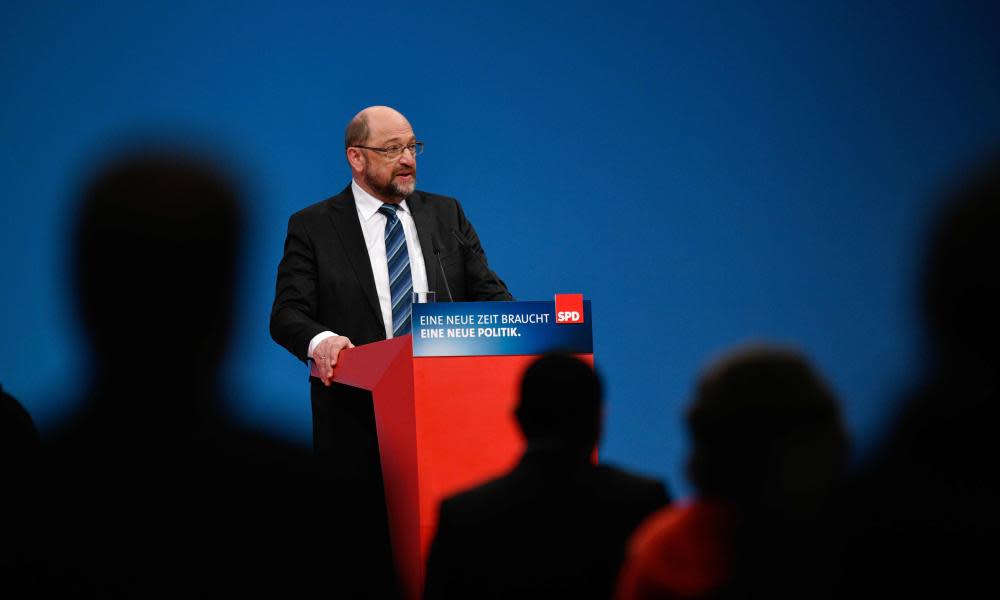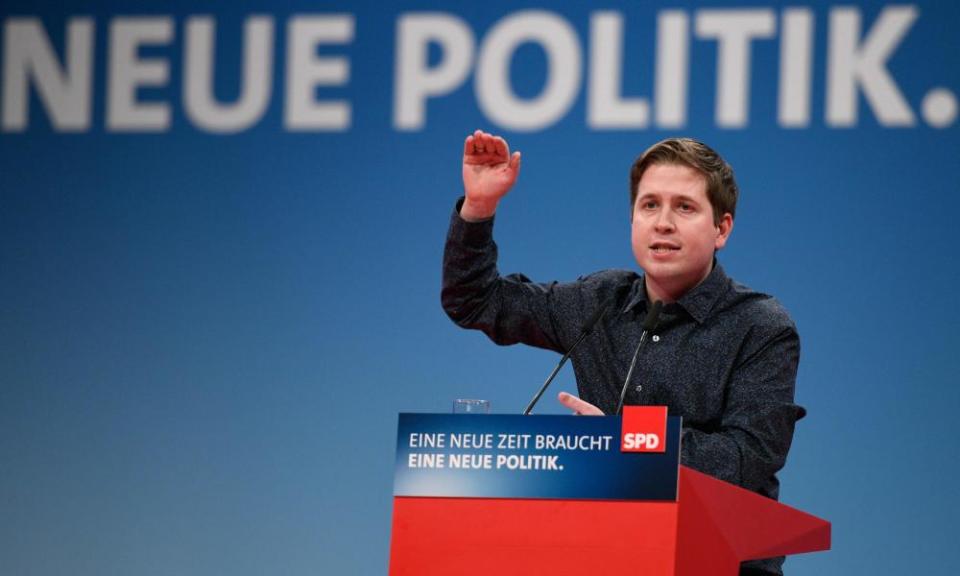Germany's SPD gives cautious green light to Merkel coalition talks

Germany has inched a step closer to forming a new government after the centre-left Social Democratic party (SPD) gave its lukewarm endorsement for a renewed Angela Merkel-led “grand coalition”.
At a special SPD congress in Bonn that welcomed a speech by the party’s leader, Martin Schulz, with sarcastic applause and saw standing ovations for his fiercest critics, 56% of the party’s delegates voted in favour of moving on to the second and final stage of coalition talks with Merkel’s centre-right Christian Democratic Union (CDU).
The cautious green light provides major relief not just for the beleaguered leaders of Germany’s two largest parties but also European heads of government, who have been holding off on major strategic decisions since federal elections in September.
After attempts to form an unorthodox “Jamaica” coalition between the CDU, the pro-business Free Democrats and the Green party collapsed in November, a no vote from SPD delegates would not only have put Schulz’s job on the line but would have raised new questions over Merkel’s future.
The leadership of Merkel's Christian Democrats will gather in Berlin tonight to discuss the outcome of the SPD party conference, and will almost certainly give green light to move on to the next stage of the coalition talks, which will likely start on Tuesday.
Merkel and Schulz's parties will then spend the next two to three weeks thrashing out a coalition agreement, with the start of the carnival season, 12 February, mooted as a deadline for the second round of talks.
Once the coalition treaty has been finalised, there is one final hurdle: a vote for all of the SPD's 443,000 members. The voting process could take as long as three weeks and could potentially unravel weeks of negotiations and throw both the political futures of Martin Schulz and Angela Merkel into doubt.
“The SPD must and will be visible, audible and recognisable,” Schulz had vowed at the end of a week spent rallying support at party offices across the country.
The former president of the European parliament defended the results of the initial phase of exploratory talks with Merkel’s centre-right party, insisting that the resulting coalition paper represented “a revolution” in German education policy as well as “a manifesto for a European Germany”.
“If we want to shape things in and for Europe, then we cannot wait a few more years,” he told the party congress. “Important decisions have to be made now – not in three, four, five years.”
Social Democrat leadership on EU issues, he said, would amount to “the end of a European policy in which Germany has only a ‘no’ to offer” and “an end to the spirit of neoliberalism”.
But the reaction of the 600 delegates to the 62-year-old’s promises remained reserved throughout. When Schulz said he had taken a call from the French president, Emmanuel Macron, on Saturday, there were audibly sarcastic groans from some parts of the hall. Many members would prefer their party to emulate the more overtly left-leaning policies of the British Labour leader, Jeremy Corbyn, rather than those of the self-declared centrist French president.
Schulz’s critics complain that the first round of coalition talks failed to deliver a single “lighthouse policy” that voters would recognise and remember above the din of daily politics.
During last year’s election campaign, the SPD had made much of a plan to abolish Germany’s dual public-private health insurance system in favour of a single “citizen’s insurance” – a policy now absent from the coalition papers.
Following the September elections at which the SPD was punished with the worst national election result since Germany became a federal republic in 1949, many supporters believe the party needs to reinvent itself in opposition.
With so many casting their vote against their leader’s recommendation, a mere show of hands did not yield a visible majority. After a nervous delay, an official count showed that 362 delegates out of 642 had endorsed the party’s official line.

The lukewarm reaction to Schulz’s speech had contrasted with enthusiastic applause for the 28-year-old leader of the Young Socialists, the SPD’s youth branch.
Kevin Kühnert, who has become the most prominent face of the internal campaign against a renewal of the alliance that has governed Germany for the past four years, said he felt his party was trapped in an “endless loop” of coalition-forming under Merkel: “We don’t want to, but we have to.”
Around Bonn’s World Conference Centre, many SPD supporters sported red gnomes’ hats – a reference to conservative politicians who have dismissed the campaign of Kühnert’s coalition sceptics as “the uprising of the dwarves”.
“Let’s be dwarves today,” the Young Socialist leader said in his speech, “so that one day we can again be giants.”
Social Democrats from the party’s influential branches in Hesse and North-Rhine Westphalia insisted over the weekend that Schulz and his team should focus on gaining additional assurances from Merkel in the next round of talks – an ambitious goal in light of Sunday’s result.
Supporters of the world’s oldest social democratic party also fear that the same grand coalition constellation that could bring much-needed stability to decision-making processes in Europe could prove harmful to the health of Germany’s national political system in the long run.
Under a renewed grand coalition, the rightwing populist party Alternative für Deutschland (AfD) would form the largest opposition force in the Bundestag. Commentators point at Austria’s recent rightward lurch after a decade of grand coalitions as proof of the view that lengthy spells of centrist rule can fan support for extremist political parties.
Schulz actively tried to fend off such criticism in his speech: “I know some say that another grand coalition would further strengthen the rightwing fringe. But who says that fresh elections wouldn’t also strengthen the right?”
Some polls after the first round of exploratory coalition talks have seen the SPD drop to record lows of 18.5% while the AfD has consolidated September’s 12.6% of the vote.
With the next phase of coalition talks likely to take two to three weeks, and the SPD insisting on putting the coalition treaty that will emerge from it to a vote among its members, the waiting for a new German government capable of making decisions is likely to continue until the end of February.

 Yahoo News
Yahoo News 
